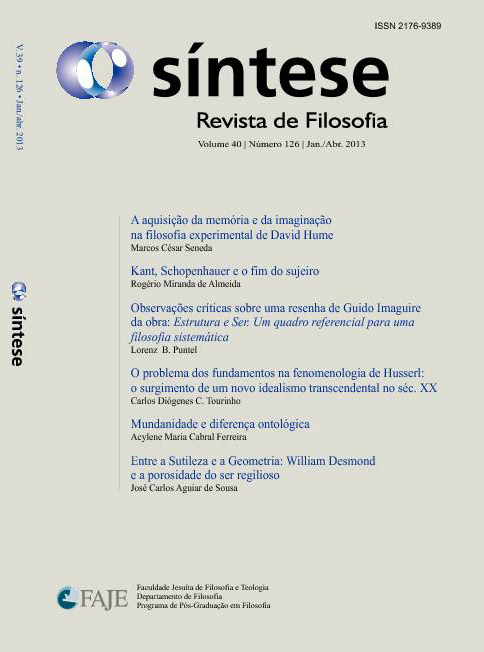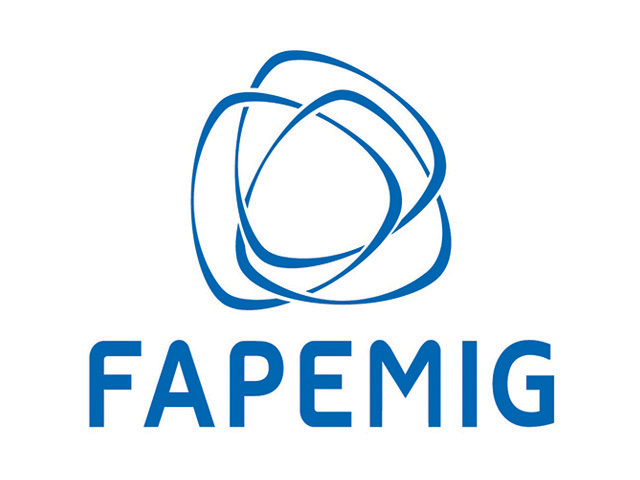OBSERVAÇÕES CRÍTICAS SOBRE UMA RESENHA DE GUIDO IMAGUIRE DA OBRA: ESTRUTURA E SER. UM QUADRO REFERENCIAL TEÓRICO PARA UMA FILOSOFIA SISTEMÁTICA
DOI:
https://doi.org/10.20911/21769389v40n126p43-72/2013Palavras-chave:
Estrutura e ser, críticas, respostas e esclarecimentos.Resumo
Este artigo responde pormenorizadamente à s críticas feitas por G. Imaguire em sua resenha do livro indicado no título (= ES). Trata-se principalmente de nove temas respectivamente teses de caráter central para a concepção exposta no livro. O presente artigo analisa cada um destes temas, em parte corrigindo erros de apresentação e de interpretação e em todos os casos respondendo à s objeções de Imaguire. Trata-se dos seguintes temas/teses: (1) Para esclarecer o estatuto das sentenças filosóficas, ES propõe uma teoria dos três operadores que explicitam o caráter de sentenças: são estes o operador teórico, o operador prático e o operador estético. O artigo esclarece o sentido exato desta teoria. (2) ES apresenta uma nova definição de saber/conhecimento em oposição direta à já famosa definição “knowledge is true justified belief” articulada por E. Gettier. (3) ES defende uma concepção de orientação ontológica das estruturas formais fundamentais (lógicas e matemáticas); estas são esclarecidas. (4) Em ES é exposta e defendida uma nova concepção de ontologia em perfeita conformidade com a semântica de uma linguagem filosófica transparente; esta ontologia exclui o conceito de “substância” e critica o uso do conceito de “objeto”. (5) ES expõe uma nova teoria semântico-ontológica da verdade que tem como consequência um relativismo moderado da verdade. (6) ES formula um argumento muito especial contra o fisicalismo; o artigo explica pormenorizadamente este argumento. (7) A concepção exposta em ES afirma que o cristianismo, em virtude do caráter racional e teórico da teologia que o explicita, constitui, em oposição a outras religiões, uma temática com prioridade de importância e atenção para o filósofo sistemático. Neste artigo esta tese é explicada e defendida contra interpretações erradas. (8) O oitavo tema é a grande questão posta pelo conceito de mundo no contexto das relações entre teorias filosóficas e teorias científicas. O artigo esclarece uma série de mal-entendidos a respeito deste grande tema. (9) Finalmente, com relação a um argumento-chave que ES apresenta para fundamentar a tese que, por razões sistemáticas, se deve admitir uma dimensão absolutamente necessária do Ser, o artigo demonstra que a resenha comete um muito grave erro de interpretação, baseando neste erro uma crítica infundada ao argumento. O artigo esclarece extensamente o argumento, suas pressuposições e suas consequências.
Abstract: This article is a detailed answer to G. Imaguire's criticisms of the book Structure and Being: A Theoretical Framework for a Systematic Philosophy (hence referred as ES). Imaguire focuses on nine topics that are central to the book. The present article analyses each one of these theses, sometimes correcting errors made and misrepresentations introduced by Imaguire, and in all cases, responding to Imaguire's objections. The theses are the following: (1) In order to clarify the status of theoretical sentences occurring in philosophical works, ES presents a theory about the three operators that make explicit the statuses of three mutually irreducible kinds of sentence: the theoretical operator, the practical operator, and the aesthetic operator. (2) ES offers a new definition of knowledge in significant opposition to the now-famous definition formulated by E. Gettier, “knowledge is true justified belief.” (3) ES defends an ontologically oriented conception of the fundamental formal (logical and mathematical) structures. (4) In ES, a new ontology is propounded in strong conformity with the semantics of a transparent philosophical language. This ontology rejects the category of substance and criticizes the widely used concept of object. (5) ES presents a completely new semantico-ontological theory of truth. One of its consequences is a moderate relativism with respect to truth. (6) ES presents a unique argument against physicalism; this article elaborates on it. (7) ES considers the phenomenon of religion and states that, due to its rational and theoretical theology, Christian religion, in opposition to other religions, provides a uniquely promising resource for philosophical considerations. (8) ES extensively thematizes the concept of world in connection with the problem of the relationship between philosophy and science. (9) Finally, ES develops the main features of a theory of Being as such and as a whole. ES offers especially an important argument on behalf of the thesis that the universal dimension of Being must be conceived of as two-dimensional: as the dimension of absolutely necessary Being and the dimension of contingent beings. This article reconstructs the exact meaning of the argument and explains its presuppositions and consequences.


















